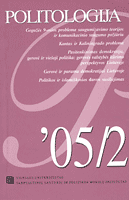Kasdienybės politizacija: (ne)politiškumo efektas Lietuvos politikoje
Daily Life’s Politization: The Effect of (Non)Political Participation in Lithuanias Political Life
Author(s): Vaidutis LaurėnasSubject(s): Politics / Political Sciences
Published by: Vilniaus universiteto leidykla & VU Tarptautinių santykių ir politikos mokslų institutas
Keywords: Democratic political process; Role of the political society-binding component; Politics as a public process; Political participation; Public sphere; R.Inglehart; M.Castell; Gidden;
Summary/Abstract: Non-participation has begun to challenge the democratic political process. Late modernity witnesses the developments that make the political process attain new contours: the individual "comes back" to the society; at the same time, however, the individual retreats from politics. Such a retreat, however, sees no counterweight in terms of the potential the development of cultural orientations, social bonds and economic activity - the factors that bind the society together - entail. In reality, neither cultural, nor social and economic pressures subside. At the same time the role of the political society-binding component remains as strong, though some seem to be wary of politics as a public process. Therefore, what regards the overall functionality of politics we are constantly bound to look for the new opportunities to expand them. In this article the author analyses the way the new dimension of political participation is emerging - the effect of (non)-participation in politics, which is achieved once the politics enter the daily life. The so-called "non-political" or non-public, daily, participation in politics turns into the newest form of participation. The effect of (non)-political participation stems from the reform of the public and non-public spheres. A rational development of a public, all-embracing, sphere has already reached its limit, whereas the daily routine is no longer confined to what remains outside the public sphere and also what stays away from the others’ eyes. Traditional understanding of a daily life undergoes a massive transformation. It becomes more open and more communicative. More and more choices the individual makes in his life are made within the framework of the daily environment. The effect of the (non)-political participation is modeled according to the following concepts: R.Inglehart's post materialist society, M.Castell's information society and A.Giddens' life politics. The article emphasizes that daily "non-politicized" participation in the political process appears to be more acceptable to the modern society individual, it is closer to the style of life the individual adheres to. He sees it to be more acceptable to assimilate even the daily lackluster, amusement-prone, sides of politics, i.e. supposedly (non)-political participation, visible within the context the personality lives in. Individualization of life and the communication opportunities opened up by the new information technologies exert a principally important for such a dissemination of politics. Author claims that the daily life's politicization is by no means "an innocent" process. Politicians and the Government try to ensure that their activities are seen as legitimate. Exactly this is done by means of trying to intervene into what is known as the daily life.
Journal: Politologija
- Issue Year: 2003
- Issue No: 2 (30)
- Page Range: 97-125
- Page Count: 29
- Language: Lithuanian

